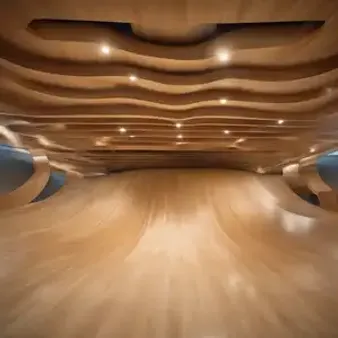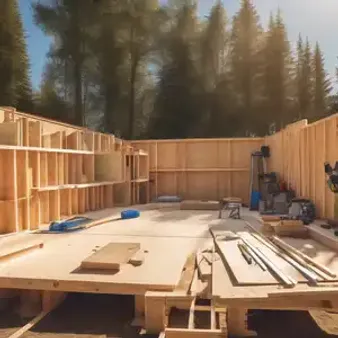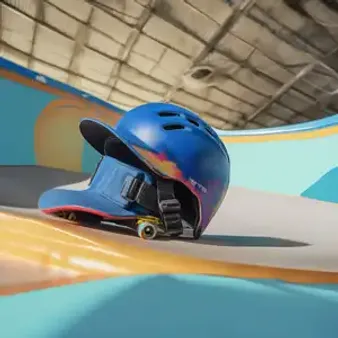Table of Contents
Ever watched skateboarders or BMX riders fly through the air on a half pipe and wished you could too? That curved wooden ramp, known as a half pipe, is more than just a structure; it's a platform for incredible stunts and pure adrenaline. At kizworld, we're breaking down everything you need to know about half pipes, from understanding their design to landing your first trick.
Feature | Description |
|---|---|
Shape | Semi-circular ramp with a flat section in the middle |
Materials | Typically wood or metal frame with a smooth riding surface |
Uses | Skateboarding, BMX riding, inline skating, scootering |
Skill Level | Suitable for a wide range of skill levels, from beginners to professionals |
Safety Gear | Helmet, pads, and appropriate footwear are crucial for safety |
Understanding the Half Pipe
Anatomy of a Half Pipe
Imagine a giant “U” made of smooth wood or metal. That’s a half pipe! It has two slopes that curve upwards, meeting at a flat section called the “transition.” The curved parts are called the “walls.” A half pipe is like a giant skateboard swing! You gain speed going up and down the walls, then launch into the air at the top.
- Walls - Curved sections of the half pipe.
- Transition - Flat section at the bottom of the half pipe.
- Coping - Rounded edge at the top of the walls.
- Deck - Flat area surrounding the half pipe.
What Makes it Special?
A half pipe is different from a regular ramp because it lets you ride continuously. You can pump up and down the walls, building momentum for bigger tricks. It’s like a never-ending wave of concrete! Remember that skate ramp you saw at the park? A half pipe is similar, just much bigger and designed for more advanced moves.
Feature | Benefit |
|---|---|
Curved Walls | Allows for continuous riding and momentum building |
Smooth Surface | Provides optimal speed and control |
Varying Sizes | Caters to different skill levels |
Understanding the Half Pipe
Building Your Own Half Pipe
So, you're ready to take the plunge and build your own half pipe? That's awesome! It's a huge undertaking, kinda like building a mini roller coaster in your backyard! You'll need a good plan, a bunch of wood and materials, and a good dose of carpentry skills. Think of it like a giant Lego project, but with power tools! It's best to start with a smaller version if you're new to this. Maybe check out some online tutorials on building skate ramps first, just to get the hang of it. Once you've mastered the basics, you can gradually work your way up to a half pipe.
Building Your Own Half Pipe
Mastering Half Pipe Tricks
Alright, so you've got the hang of riding the half pipe, feeling pretty good about yourself, huh? Time to step it up and learn some cool tricks! Think of it like learning to ride a bike – first, you wobble around, then you’re popping wheelies like a pro! Start with basic moves like pumping to gain speed on the walls. It's all about finding that sweet spot and using your body weight to create momentum. Once you're comfortable with that, you can try dropping in from the coping - it's a little scary at first, but the rush is amazing! Remember, you won't nail it on the first try, and that's okay! Even Tony Hawk ate it a bunch of times before he was landing 900s!
- Start with basic pumps and carves.
- Practice dropping in from the coping.
- Gradually work your way up to more advanced tricks.
Mastering Half Pipe Tricks
Safety on the Half Pipe
Safety on a half pipe is like wearing a helmet when you ride your bike – it's super important! Before you even think about dropping in, gear up! A helmet is a must-have – it protects your head if you take a tumble. And trust me, even the pros fall sometimes! Knee pads, elbow pads, and wrist guards are your best friends too. They'll cushion the blow if you wipe out. Remember that time you fell off your skateboard and scraped your knee? Yeah, let's avoid that on the half pipe!
Gear | Why It Matters |
|---|---|
Helmet | Protects your head from impact |
Knee Pads | Shield your knees from scrapes and bumps |
Elbow Pads | Protect your elbows during falls |
Wrist Guards | Provide support and prevent wrist injuries |
Starting out? Don't try anything crazy until you're comfortable riding the half pipe. It's like learning to swim – you wouldn't jump into the deep end without knowing how to float, right? Start small, get the feel of the ramp, and gradually work your way up to bigger tricks. And hey, remember those skateboarding tips for beginners? A lot of those same principles apply here. It’s always a good idea to have a buddy with you too, just in case you need a helping hand. Plus, it's way more fun to shred with friends!
Safety on the Half Pipe
Final Thought
The half pipe is a challenging but rewarding structure that pushes the boundaries of what's possible in extreme sports. Whether you're a seasoned pro or just starting out, remember to prioritize safety, practice consistently, and most importantly, have fun. See you on the ramp!